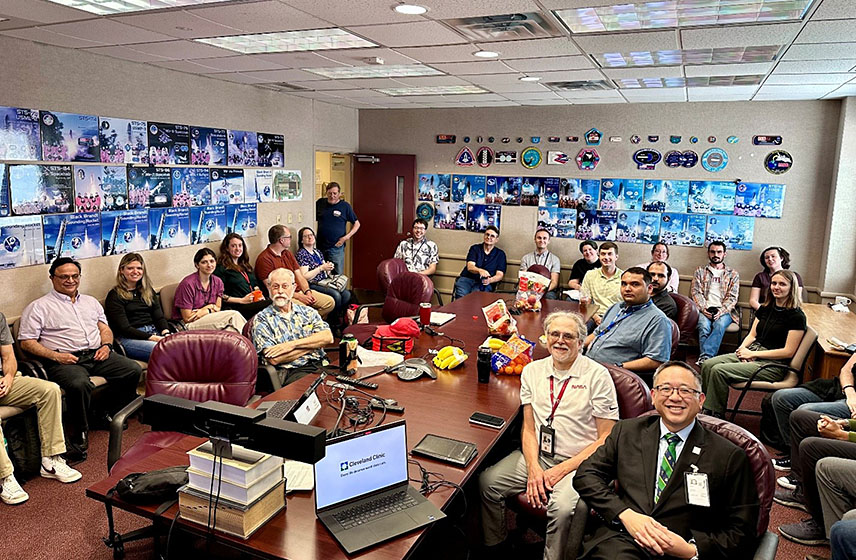
Space Health Center
Located within the Heart, Vascular and Thoracic Institute of Cleveland Clinic, the center is led by a multidisciplinary team of medical experts, who research the effects of space travel on cardiovascular function and health. They also educate healthcare professionals, medical students and the public on the cardiovascular effects of space travel and provide cardiovascular medical care for those traveling to space.
Areas of Focus
Research
Researching the effects of space travel on cardiovascular function and health.
Education
Educating others on the cardiovascular effects of space travel.
Collaborative Care
Providing cardiovascular medical care for those traveling to space.
Our Team

Director
Kenneth A. Mayuga, MD, FAHA, FHRS, FACC, FACP
Steven Nissen, MD
Preventive Cardiology
Rohit Moudgil, MD PhD
Clinical Cardiology
Ziad Taimeh, MD
Heart Failure Cardiology

Erik Van Iterson, PhD
Cardiac Rehabilitation
Tamanna Singh, MD
Sports Cardiology
Abdulla Damluji, MD PhD
Interventional Cardiology
Amar Krishnaswamy, MD
Interventional Cardiology: Structural
Khaled Ziada, MD
Interventional Cardiology: Coronary
Patrick Collier, MD
Cardiac Imaging
Bo Xu, MD
Cardiac Imaging
Niraj Varma, MD PhD
Cardiac Electrophysiology
Arwa Younis, MD
Cardiac Electrophysiology
Collaborations
- NASA Glenn Research Center. (Cleveland, OH)
- Blue Abyss (United Kingdom / Cleveland, OH)
- International Space University (France / USA)
- Cleveland Clinic Research
- Cleveland Clinic Lerner College of Medicine of Case Western Reserve University
Grant Funding
Grant: International Space Station National Laboratory (Melbourne, FL, US)
Principle Investigator: Kenneth A. Mayuga, MD. Grant Agreement GA-2024-9645
Publications: Cleveland Clinic and Space
- Iskovitz I, Kassemi M, Thomas JD. Impact of weightlessness on cardiac shape and left ventricular stress/strain distributions. J Biomech Eng. 2013 Dec;135(12):121008. doi: 10.1115/1.4025464. PMID: 24048335.
Frequently Asked Questions
Why study cardiovascular health and space?
To benefit the health of people going to space, we need to understand the new rules for how our bodies operate while in microgravity, the significantly reduced gravitational forces in space. These forces can have long-term effects after returning from orbit.
Astronauts seemingly “float” when they’re in space but technically are constantly in a state of freefall. This is because they still experience low levels of microgravity during space travel. Reduced gravity is a major and unnatural change to our environment, so it influences the physics of how the organs and systems in our bodies operate. So does the constant force of being in freefall.
How is the heart impacted by space travel and microgravity?
Environmental changes affect the shape and function of each piece of our cardiovascular systems, including heart, vessels and blood flow in our bodies. These changes also influence the electrical systems our bodies use to coordinate heart rate and rhythm.
Cleveland Clinic’s Space Health Center brings together our world-class cardiovascular health experts to understand all the different pieces of these systems. This research seeks to improve how we prevent and treat cardiovascular conditions for patients experiencing environmental changes, both in healthcare and for the organizations conducting space travel.










